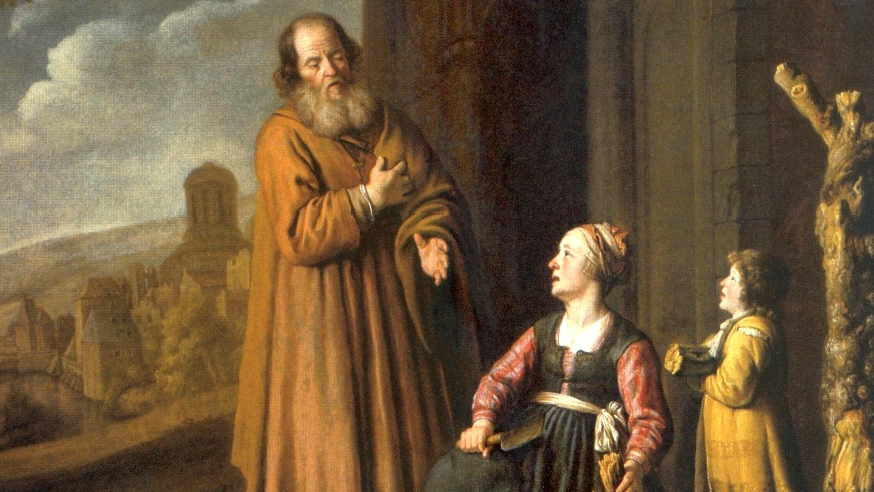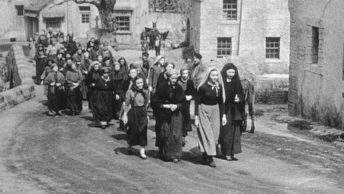Those who recently lost a loved one to a premature or sudden death might wonder: Where was Elijah? Or where was Jesus when we were trying the keep our loved one from being yanked away from our affection? This feeling, a mixture of anger and dismay is quite understandable. The searing pain of separation is more acute and less acceptable whenever death strikes one who, humanly speaking, has a whole life still to live. I am referring, of course, to children and young people.
All this is quite true. Yet we still have to avoid assigning too much weight to the fact that Elijah and Jesus merely prolonged by a few years the physical life of two people. On this 10th Sunday in Ordinary Time, let us reflect on the two miracles with critical detachment. This is necessary so that we may avoid missing the deeper significance that is designed to turn what we read in 1 Kings (17:17-24) and the Gospel of Luke (7:11-17) into “good news.” With cool detachment we ask: “How much longer did the son of the widow of Zarephath live after the prophet Elijah brought him back to life? Who died first, the son or the mother? We shall ask the same questions about the young son of the widow of Nain. How many years did he live after Jesus raised him from death? Who died first, the son or the mother?
Here is the point we should not miss. The sensational feat of bringing back to life the child of the widow of Zarephath and other people restored to life in the Old Testament, in addition to the son of the widow of Nain, Lazarus, Jesus’ close friend, the twelve-year-old daughter of Jairus, and all those brought back to life by the Apostles in the New Testament, are all “smaller miracles” than the ongoing miracle of the infinite compassion that flows uninterruptedly from the heart of the Father in heaven, through the channel that is the flesh of Jesus his Son to touch the lives of so many.
From the moment our God took on flesh in the womb of Mary, the mother of all miracles should be that the Lord is and will be with us; that he is and will be Emmanuel. In the Gospel passage, we find a perfect sample of our “God with us.” We find a God whose heart is full to overflowing with sincere compassion. He was moved with pity for her and said to her, “Do not weep.”
Today, we are called to rejoice because we have learned that every aspect of our earthly existence is touched by the Incarnation, i.e., by God in human flesh like ours, by the God who has visited his people. From now on we cannot forget that our God is not ashamed to look too “human,” too moved by tenderness and compassion.
To help us etch this concept in the back of our mind, here are some significant passages:
- Matthew 9:36 At the sight of the crowds, his heart was moved with pity for them because they were troubled and abandoned, like sheep without a shepherd.
- John 11:33 When Jesus saw her weeping and the Jews who had come with her weeping, he became perturbed and deeply troubled,
- Mark 10:14-16 When Jesus saw this he became indignant and said to them, “Let the children come to me; do not prevent them, for the kingdom of God belongs to such as these. Amen, I say to you, whoever does not accept the kingdom of God like a child will not enter it.” Then he embraced them and blessed them, placing his hands on them.
- Matthew 11:28 “Come to me, all you who labor and are burdened, and I will give you rest.”
Through the Incarnation, our God breaks the embankment between what is divine and what is merely human and floods the desolate land of our anguish and exertion. In Jesus we can see how “human” God truly is. Jesus is God so “human” that he cannot remain unaffected by the tears of the widow of Nain. He feels compelled to give her back her son even without her having to ask him.
Our God in human flesh drives home this vital point: his compassion anticipates our requests. He feels our pain naturally, spontaneously. God’s compassion is all around us and embraces us the way a mother’s love envelops every single one of her children with unique intensity and alertness.
Let us notice the contrast before and after God takes on human flesh. The widow of Zarephath asked with insistence, actually, with more than a touch of anger in her voice, that the prophet had to give her back her son alive. Jesus, God in human flesh feels instantly all our anguish and intervenes the way God alone can. In Jesus resides the fullness of humanity in the fullness of divinity. This realization ought to stimulate us to understand that our humanness resembles closely the humanness of Jesus to the measure that we are drawn to be moved with compassion for those around us. Life on this earth is such that we are constantly exposed to instances that beg us to intervene with caring love and compassion.
Medicine, science and technology have made enormous progress in recent decades. Practically speaking, these three branches of human achievements are doing what the prophet Elijah and Jesus did: they are allowing people to live longer lives. Yet our contribution is as needed as ever! We are called by our very nature as members of the Body of Christ, to draw close with sincere compassion, empathy and solidarity to those who suffer.
But perhaps some of us do not yet feel the impulse to draw close to the suffering; we hesitate. Maybe we fear the inability to come up with the right words and the proper demeanor if we were to get too close to those in pain. Yet there is no need to fear; no need to have second thoughts. For God is with us! As such, before we approach those who suffer, we should ask Jesus to share with us some of his human/divine compassion after which we should invoke the Holy Spirit and beg him to grant us the right inner disposition of sincere compassion and, whenever words might be necessary, also to place in our heart and on our lips the right ones. The Spirit of the Lord Jesus will teach us how to convey to those who suffer how much their case is touching and moving us and how much we desire to help.








